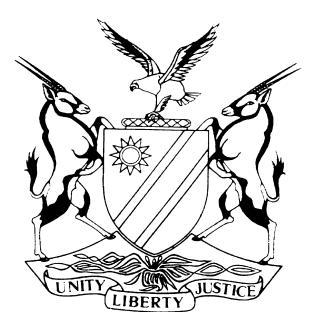REPUBLIC OF NAMIBIA

HIGH COURT OF NAMIBIA MAIN DIVISION, WINDHOEK
RULING
PRACTICE DIRECTION 61
Case Title: FIRST NATIONAL BANK OF NAMIBIA // ROBERT UUGWANGA | Case No: HC-MD-CIV-ACT-CON-2023/00046 | |
Division of Court: HIGH COURT (MAIN DIVISION) | ||
Heard before: CLAASEN J | Heard on: 20 OCTOBER 2023 | |
Delivered on: 8 NOVEMBER 2023 | ||
Neutral citation: First National Bank Of Namibia // Uugwanga CC (HC-MD-CIV-ACT-CON-2023/00046) [2023] NAHCMD 719 (8 November 2023) | ||
Order: | ||
CERTAIN: Erf No 623, Goreangab (Extension 2)
SITUATE: In the municipality of Windhoek Registration Division “K” Windhoek MEASURING: 200 (two hundred) square meters HELD: Deed of Transfer No. T3229/2013 SUBJECT: to all the terms and conditions contained therein
| ||
Reasons: | ||
CLAASEN J: [1] In this matter the applicant obtained a default judgment in its favour on 15 February 2023 for payment of N$671 712,17 plus interest and costs. Following a nulla bona return of service in respect of movables, the applicant applied for an order to declare the execution debtor’s immovable property executable. [2] Counsel for the applicant argued that the debtor’s monthly income exceeds the monthly expenses by far and that information was depicted in the bank statement as he banks with the applicant. The home loan account1 reflected an outstanding balance was N$746 278,44 with an arrears balance of N$ 103 824.27. The current monthly instalment was N$9 281,96. [3] According to the plaintiff, the debtor’s average monthly income was N$10 000 and for this year the applicant had only been able to pay three instalments and thus even with restructuring the loan the defendant is unable to continue to service the loan. Counsel stated that when the debtor was asked to make a settlement offer, he indicated that he cannot afford to pay the loan. The applicant also invited the debtor to provide information as to his financial position, but the debtor was not forthcoming with that and it led to naught. [4] The debtor informed the court that indeed the immovable property was his primary home which he had been paying for 9 years. He explained that he fell into arrears because of an undetected water leakage that culminated in an overdue municipal account of approximately N$65 000. That made it difficult to pay the home loan. [5] Upon enquiry by the court, the debtor divulged that he is employed at a Government institution where he earns about N$20 000 monthly. He also stated that his wife, to whom he was married out of community of property, was willing to assist him with N$3 000 monthly. He also stated that he was trying to sell his vehicle, though he was unable to provide an estimate of the amount that could be realized from that, if and when it occurred. He has no children, though he indicated that he was assisting extended family members. He stated that the applicant indicated that they would accept about N$18 000 monthly until the arrears were settled, which amount he simply could not do at this stage. He proposed that he remain with the current instalment and only pay the arrears as of November 2024. [6] In matters of this nature, the evidential burden rests on the debtor to come forth with viable less drastic measures than to sell the immovable property in execution. The parties appeared before a different court previously and the order shows that they were afforded another chance to file affidavits. The record shows that the debtor was informed to deal with less drastic measures therein. Instead of an affidavit, he filed a document with no supporting documents in relation to his finances or assets and the enquiry proceeded on that basis. [7] In Kisilipile and Another v First National Bank of Namibia Limited2 it was stated that: ‘[19] The debtor must be invited to present alternatives that the court should consider to avoid a sale in execution but bearing in mind that the credit giver has a right to satisfaction of the bargain. The alternatives must be viable in that it must not amount to defeating the commercial interest of the creditor by in effect amounting to non-payment and stringing the creditor along until someday the debtor has the means to pay the debt.’ [8] I accept that it will be difficult to lay one’s cards in the open, but it is unfortunately part of the process of trying to save one’s house from execution. In this matter, the debtor elected to not put forth his version under oath and also came to court without any supporting document to cement the information. In addition, the debtor did not dispute the dire financial picture that the applicant deposed to under oath, which was evident from the bank statement. That did nothing to satisfy the court that he is in a position to have a concrete and viable plan in place to service the loan and settle the arrears on the account. As such, he failed to discharge the onus on him.
[9] Thus the court grants the application as prayed for.
CERTAIN: Erf No 623, Goreangab (Extension 2)
SITUATE: In the municipality of Windhoek Registration Division “K” Windhoek MEASURING: 200 (two hundred) square meters HELD: Deed of Transfer No. T3229/2013 SUBJECT: to all the terms and conditions contained therein
| ||
Judge’s signature: | Note to the parties: | |
Not applicable. | ||
Counsel: | ||
Applicant | Second Respondent | |
J Gaya Of Fisher, Quarmby, Windhoek | R N Uugwanga In Person (on behalf of the respondent) | |
1 As at 16 September 2023.
2 Kisilipile and Another v First National Bank of Namibia Limited 2021 (4) NR 921(SC).